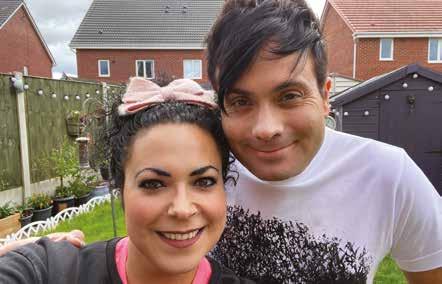
5 minute read
CHANGING THE LANGUAGE OF STIGMA
PLAY YOUR PART IN
SAVING LIVES
Male suicides in England and Wales are now at their highest rate in two decades. A report by the Office for National Statistics (ONS) reveals that suicide rates for women are also at their highest since 2004 – with a significant rise among females aged 10 to 24.
We look at initiatives to help us all play a part in talking to save lives. And we hear from one man who says we musn’t be afraid to have the conversation.
TV ANTHROPOLOGIST
ALICE TALKS MENTAL HEALTH

Television anthropologist and biologist Professor Alice Roberts is presenting the first in a series of special Life Matters podcasts brought to your living room by the Zero Suicide Alliance.
The academic, writer and broadcaster is a familiar face, as part of the BBC series Coast and Channel 4s Time Team. In the first podcast she reveals how her interest in mental health stems from her own experience of depression. It features a Bolton barber who offers a listening ear to clients who open up about personal issues, and hears how soaps like Hollyoaks are raising awareness of male suicide.
CHANGING THE
LANGUAGE OF STIGMA A leading UK events organisation is joining the campaign to tackle the potentially lethal effect of stigmatising language around mental health.
Corporate Entertainment language used isn’t even intentional Professionals provides and sometimes it’s down to a lack of entertainment for corporate education, but we do know that by hospitality events. Following perpetuating existing stereotypes alienates talks with the Zero Suicide Alliance and those who need help and stops them Mersey Care, the company is aiming to from reaching out.” lead the way in sensitising marketing language and encouraging other agencies to do the same. Owners Samantha Fellowes and Daisy Stapley-Bunten have also become ZSA members and are taking their suicide They plan to remove acts with mental prevention training. health connotations, such as a straitjacketed ‘patient’ who scares guests at events. And they’re renaming acts such as ‘Crazy Scientist’, advising clients against using ‘Psycho Ward’ and ‘Insane Asylum’ themes, and suggesting alternative themes. Daisy, CEP’s Chief Operating Officer, said: “It’s important to say that the intention of this campaign isn’t to assign blame to the entertainment industry for past language used, but rather to encourage fellow agencies to follow suit and disrupt the status quo. I’m Joe Rafferty chairman of ZSA said: “I sure that together we can fight mental applaud CEP for the lead they are taking health stigma and we’re so honoured in helping to set the standards in their to be heading this initiative alongside industry. Quite often the use of stigmatising the ZSA and Mersey Care.”
ASK THE
SUICIDE QUESTION

Ben Harris is 38. He knows what it’s like to feel suicidal. He also knows that by talking and getting help it can get better. Here’s his story…
“I’d struggled with my mental Looking back, when I thought about health since my twenties, but suicide it was to get some relief that I thought it was just my quirky there might be an end to the mental ways so I didn’t speak about it. I anguish. It was like being in a tunnel didn’t know I was entering a crisis. with no light at the end. I didn’t want My family did. They tried to help but to hurt my family and my partner but they didn’t know how to. I felt they’d be better off without me. I thought a lot about death and how to end my life. I didn’t want to die, I just wanted what was to make sense of what was going on in my head – and I wanted it to end.
My partner Nevean says I looked vacant back then. My parents say I was just a shell. I became psychotic. I thought people could read my mind, that I was getting signals from the TV to take my life. I started to self harm. It wasn’t till I went to my GP five years ago that I lifted the lid on 20 years of silence. I went into a mental health unit and then into the early intervention service, where I started working with a psychologist Diane Griffiths. She rolled up her sleeves and got into the root of the problem. She was amazing; she helped me tackle my thoughts and feelings. For two years after that I was still self harming, but then I know it was a way of developing a tolerance to unpleasant feelings as I worked on being myself. I’d been with Nevean for 11 years. It must have been so difficult for her and my parents. The more I opened up to professionals the more I could see little chunks of hope. I still have bad times, but where before it would knock me back for years, I’m able talk openly without fear of repercussion. I’ve realised I don’t have to skirt round the issue to those closest to me.
If you think someone is suicidal ask, in a matter of fact way. It won’t make them any more likely to do it, but they’ll be glad you’ve asked and started the conversation I waited so long to have.
You can view Ben’s full story at
Zero Suicide Alliance YouTube channel










